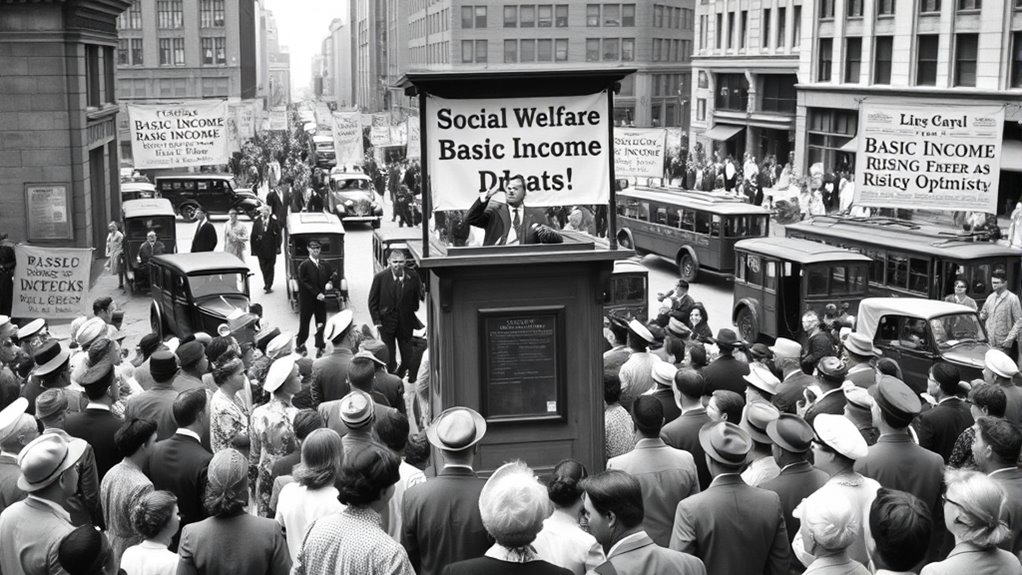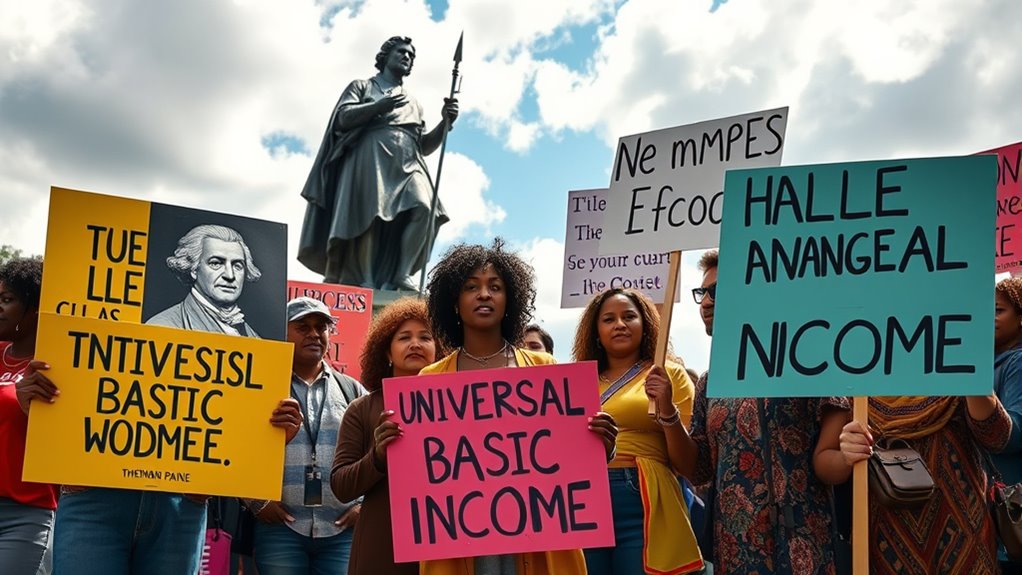The idea of basic income has a long history, starting with early thinkers like Thomas More and Thomas Paine, who proposed banknotes and support systems to promote independence. Over time, social and economic movements expanded these concepts, leading to experiments and policy discussions in the 20th century. Today, many countries are exploring or implementing projects to guarantee economic security for all. If you keep exploring, you’ll discover how these ideas have evolved into modern debates and initiatives.
Key Takeaways
- Early thinkers like Thomas More, Juan Luis Vives, and Thomas Paine proposed social support and basic income ideas in the 16th-18th centuries.
- 19th-century advocates such as Henry George and Joseph Charlier promoted ideas like land rent and social dividends for economic security.
- The 20th century saw experiments and policy proposals, including Nixon’s Family Assistance Plan and city-level guaranteed income programs.
- Academic and advocacy organizations like BIEN advanced global discussions, research, and pilot projects on universal basic income.
- Public support varies today, influenced by demographics, politics, and ongoing experiments, shaping future policy debates.
Top picks for "brief history basic"
Open Amazon search results for this keyword.
As an affiliate, we earn on qualifying purchases.
Early Pioneers and Proposals in the 18th and 19th Centuries

In the 18th and 19th centuries, early thinkers laid the groundwork for the idea of a basic income, even if their proposals differed from today’s understanding. Thomas Paine suggested giving young adults a lump sum at age 21 to help them buy property or start businesses, aiming to reduce poverty and promote independence. Thomas Spence proposed implementing basic income at a local level to build on Paine’s ideas, seeking to lessen tensions between the wealthy and the poor. Meanwhile, thinkers like Thomas More discussed minimum income guarantees before Paine and Spence. Joseph Charlier later expanded these ideas to the national level in the 19th century, emphasizing the potential of basic income as a government policy. These pioneers set the stage for modern debates on social security. Early proposals for social security also reflected concerns about economic security and social stability, which continue to influence policy discussions today. Additionally, innovations in policy design during this period laid the foundation for contemporary basic income experiments and implementations, with some early efforts focusing on universal coverage to address broad social needs. Furthermore, the concept of a guaranteed income was influenced by emerging ideas about economic security and the role of government in ensuring social well-being, with some early advocates emphasizing public welfare as a central goal.
The Rise of Support and Policy Ideas in the Early 20th Century

The early 20th century marked a period when the idea of a basic income started gaining serious attention, fueled by social movements and economic debates. You’d see diverse terms like “social dividend” or “state bonus” emerge, reflecting different visions. Discussions began locally, often in isolation, with advocates working independently and unaware of each other. Interest grew gradually, leading to the formation of early advocacy groups, even if they lacked influence. Economic conditions such as poverty and inequality shaped these ideas, inspiring innovative financing concepts like land taxes or social dividends. Some early experiments surfaced, and thinkers like Henry George influenced the thinking. Social movements, especially feminist and welfare rights advocates, pushed for basic income as a fair alternative to existing welfare systems. Additionally, the development of AI technologies began to influence how policymakers and researchers approached economic security proposals, highlighting the increasing importance of technological innovation in shaping social policy.
Political Movements and Experiments in the Mid-20th Century

During the mid-20th century, U.S. policy initiatives and academic movements shaped the push for basic income. You can see how experiments like the negative income tax and advocacy by economists like Milton Friedman influenced public debate. These efforts laid the groundwork for future discussions on income guarantees and social welfare reforms.
U.S. Policy Initiatives
Have you ever wondered how mid-20th-century U.S. policymakers experimented with ideas resembling basic income? During this period, social welfare debates gained momentum, with proposals like Nixon’s Family Assistance Plan aiming to provide guaranteed income, though it was ultimately rejected. The Alaska Permanent Fund, established in 1976, distributes oil revenue dividends to residents, serving as a form of guaranteed income. Several cities and states piloted UBI-like programs, often facing funding hurdles and mixed results. Private organizations also experimented with similar concepts. These initiatives sparked ongoing debates about work incentives, funding, and public perception. Despite setbacks, these efforts set the stage for future discussions on implementing basic income at federal and local levels. Understanding the legalities and zoning regulations for tiny houses can inform future housing policies and community planning.
Academic and Advocacy Movements
Ever wonder how academic and advocacy movements shaped mid-20th-century debates on basic income? You’d see early advocates like Thomas Paine proposing a “ground rent” to reduce inequality. Henry George’s idea of a public land fund aimed to fund universal pensions. Modern thinkers like Philippe Van Parijs and Guy Standing advanced UBI theories, while groups like the Basic Income Research Group (founded in 1984 in the UK) and the Basic Income Earth Network (established in 1986) organized global discussions. Advocacy grew through feminist and welfare rights movements, with figures like Martin Luther King Jr. pushing for a guaranteed minimum income. Experiments in the U.S. (1960s) and Canada (1970s) tested UBI’s impact, influencing political support from leaders like Nixon and McGovern, and inspiring worldwide activism. Significant academic conferences and publications during this period helped to legitimize the idea among policymakers and scholars alike, with increased recognition of the importance of public policy in implementing such programs. Additionally, the development of data analytics and other AI-driven tools facilitated more rigorous evaluations of pilot programs and policy proposals. Furthermore, the growing awareness of the cultural intelligence component of social policy implementation highlighted the importance of understanding diverse cultural contexts in designing effective basic income programs. This period also saw the emergence of interdisciplinary research that integrated economics, sociology, and political science to better understand the potential impacts of UBI on society, with an emphasis on how cultural factors influence policy acceptance and success.
Global Expansion and New Initiatives in the 21st Century

How has the 21st century seen a global surge in basic income initiatives? You’re witnessing a wave of local pilots and experiments designed to test and expand the idea worldwide. In the U.S., cities like Stockton, Compton, and Tacoma launched programs targeting diverse populations, from low-income residents to families, with results expected soon. Public figures like Andrew Yang and Elon Musk support UBI as a response to automation and economic shifts. Globally, discussions continue, with countries exploring basic income amid debates on social welfare and technological change. Research institutions evaluate pilot impacts, emphasizing economic justice and racial equity. These efforts reflect a broader recognition that basic income could help address inequalities and adapt to future challenges. Additionally, concerns about the security vulnerabilities in new payment systems highlight the importance of implementing robust cybersecurity measures in merchant services to protect participants and stakeholders. As these initiatives expand, the importance of cybersecurity measures becomes increasingly critical to safeguard both the integrity of the programs and the privacy of recipients. Recognizing the importance of digital security is vital for maintaining trust and effectiveness in these innovative social programs. Moreover, understanding the role of astrological compatibility can provide insights into interpersonal relationships that may influence community engagement and social cohesion within these initiatives. Furthermore, understanding the complexities of virtual affairs and their impact on trust can inform strategies to strengthen community support and resilience in these programs.
Contemporary Programs and Ongoing Advocacy Efforts

You can see how city-level guaranteed income programs are gaining ground, with local governments launching initiatives influenced by pandemic spending. At the same time, policy advocacy efforts are growing stronger through organizations and coalitions pushing for broader UBI adoption. As public support continues to rise, these efforts are shaping the future of basic income as a viable social policy. Additionally, understanding the signs of spoilage and proper storage methods can help ensure the safety and freshness of perishable food items involved in these discussions. Recognizing the importance of vetted information in policy debates can further strengthen the credibility of advocacy efforts, ensuring that proposals are based on reliable data. Considering the home furnishings aspect, ensuring that heated mattress pads are used safely and maintained properly can prevent hazards and extend their lifespan, supporting sustainable and effective implementation of these programs. Moreover, emphasizing the role of trust-building strategies can be crucial in gaining public and stakeholder support for these initiatives. Incorporating goal tracking techniques can also help advocates and policymakers monitor progress and make informed adjustments to their strategies.
City-Level Guaranteed Income
City-level guaranteed income programs are gaining traction as innovative solutions to address economic insecurity and housing instability. These initiatives provide direct cash support, often unconditional, helping residents meet basic needs. For example, New York City’s The Bridge Project offers pregnant individuals facing housing insecurity three years of unconditional income. Mount Vernon’s Level Up program gives $500 monthly to 200 residents for a year, promoting stability. Many programs target vulnerable populations, including low-income families and marginalized communities, aiming to reduce poverty and improve health outcomes. They’re funded through municipal budgets or grants and focus on short- to medium-term support. Ongoing data collection helps evaluate success, with local efforts informing broader policy debates and potential federal initiatives. These programs demonstrate how city-level action can foster economic resilience.
Policy Advocacy Initiatives
Contemporary policy advocacy initiatives are actively shaping the future of basic income through collaborative efforts, innovative programs, and strategic campaigning. Organizations like BIEN host events such as the Basic Income Training 2025, fostering discussions on design and implementation. The Guaranteed Income Community of Practice brings experts together to *switch* pilots into lasting policies. Initiatives like Cash as Care highlight how guaranteed income benefits marginalized groups, especially mothers, by improving health and community ties. The Economic Security Project leverages successful pilots like SEED to push for broader cash policies. Internationally, projects in India and Bangladesh combine cash payments with community development, fostering social solidarity. These efforts aim to reshape perceptions, influence policy, and build trust, driving the movement toward widespread adoption of basic income. Additionally, understanding the different types of paint sprayers and their benefits can inform various applications and innovations in related fields. Moreover, policy influence plays a crucial role in shifting public opinion and legislative priorities to support basic income initiatives. Recognizing the role of AI in business can further enhance advocacy strategies and policy outcomes by providing data-driven insights. Furthermore, considering the sugar content in candies and other products can impact health-related policies and consumer choices, emphasizing the importance of informed decision-making.
Growing Public Support
How has public opinion on universal basic income evolved in recent years? Support varies widely across demographics, with younger adults, minorities, and lower-income households favoring it more. Political alignment influences views: Democrats tend to support, while Republicans often oppose UBI. Recent polls show fluctuating support levels, sometimes rising, sometimes falling. Globally, acceptance differs, with some countries more open to UBI than others. Ongoing advocacy fuels public debate through media coverage, especially as automation and AI threaten jobs. Economic crises, like COVID-19, highlight the need for financial security, boosting support. Advocates argue UBI can reduce poverty and inequality, but cost, funding, and political hurdles remain significant challenges.
- Demographic differences in support
- Impact of automation and AI
- Role of media and public discourse
- Effects of economic crises
- Global variations in acceptance
The Evolving Landscape of Basic Income Discourse

The discourse surrounding basic income has considerably evolved over recent decades, shaped by economic shifts, technological advancements, and social movements. You’ve seen early ideas from thinkers like Thomas More and Juan Luis Vives, who envisioned some form of social support. In the 20th century, debates expanded with figures like Milton Friedman and Martin Luther King Jr., alongside experiments in places like Alaska and India. Today, discussions focus on automation’s impact on jobs, economic security, and environmental concerns. Movements and academic conferences, such as BIEN, drive the conversation forward. Governments worldwide now pilot or consider basic income programs, reflecting its growing relevance. You’re witnessing a dynamic landscape where ideas transform into policy proposals, influenced by societal change, technological progress, and the urgent need for economic resilience.
Frequently Asked Questions
What Are the Main Economic Arguments for and Against Basic Income?
You see that the main economic arguments for basic income include boosting security, reducing bureaucracy, stimulating local economies, and encouraging better work conditions. Conversely, critics worry about high costs, potential work disincentives, inflation, operational challenges, and whether it effectively reduces inequality. Overall, UBI offers benefits like increased spending and innovation but faces challenges in funding, implementation, and balancing support with work incentives.
How Does Basic Income Differ From Traditional Welfare Programs?
You’ll find that basic income differs from traditional welfare programs mainly in its design and purpose. It offers unconditional cash to everyone, regardless of employment, promoting dignity and personal choice. Unlike targeted welfare, it’s universal, simpler to administer, and can reduce bureaucracy. While traditional programs often impose restrictions, basic income provides consistent financial security, encouraging economic freedom, mobility, and a safety net for all, fostering social justice and individual autonomy.
What Challenges Do Countries Face When Implementing Universal Basic Income?
You face numerous challenges when implementing UBI. Funding is tough, especially for developing countries with limited tax bases and large informal sectors. Administrative hurdles like identifying beneficiaries and ensuring proper distribution complicate things further. Socioeconomic issues, such as labor market impacts and public acceptance, also pose risks. Political support is essential, but gaining consensus can be difficult, and scaling programs from pilot to national levels adds logistical and financial complexities.
How Have Technological Changes Influenced the Push for Basic Income?
Imagine technology as a river, constantly reshaping the landscape. It pushes society to rethink economic safety nets like basic income, especially as automation and AI threaten jobs. These changes make you see UBI as a lifeline, ensuring everyone can navigate the shifting currents. The more tech advances, the more you realize that a basic income could be the steady boat keeping society afloat amid rapid waves of change.
What Are the Potential Long-Term Societal Impacts of Widespread Basic Income?
You might see widespread basic income fostering stronger communities, reducing poverty, and boosting social cohesion. It could encourage more people to engage in caregiving, education, or entrepreneurship without fear of financial instability. Over time, you may notice increased civic participation and social empowerment. However, political challenges could threaten its stability, so long-term societal impacts depend on sustained support, effective implementation, and societal consensus on the value of economic security for all.
Conclusion
You see how basic income has evolved from past ideals to present experiments. You witness dreams of economic security turning into policy debates, from pioneering thinkers to modern advocates. You understand the ongoing quest for fairness, the push for innovation, and the hope for a more equitable future. You realize that this journey isn’t over—it’s a continuous pursuit, a shared effort, and a collective movement toward a world where everyone has enough.









